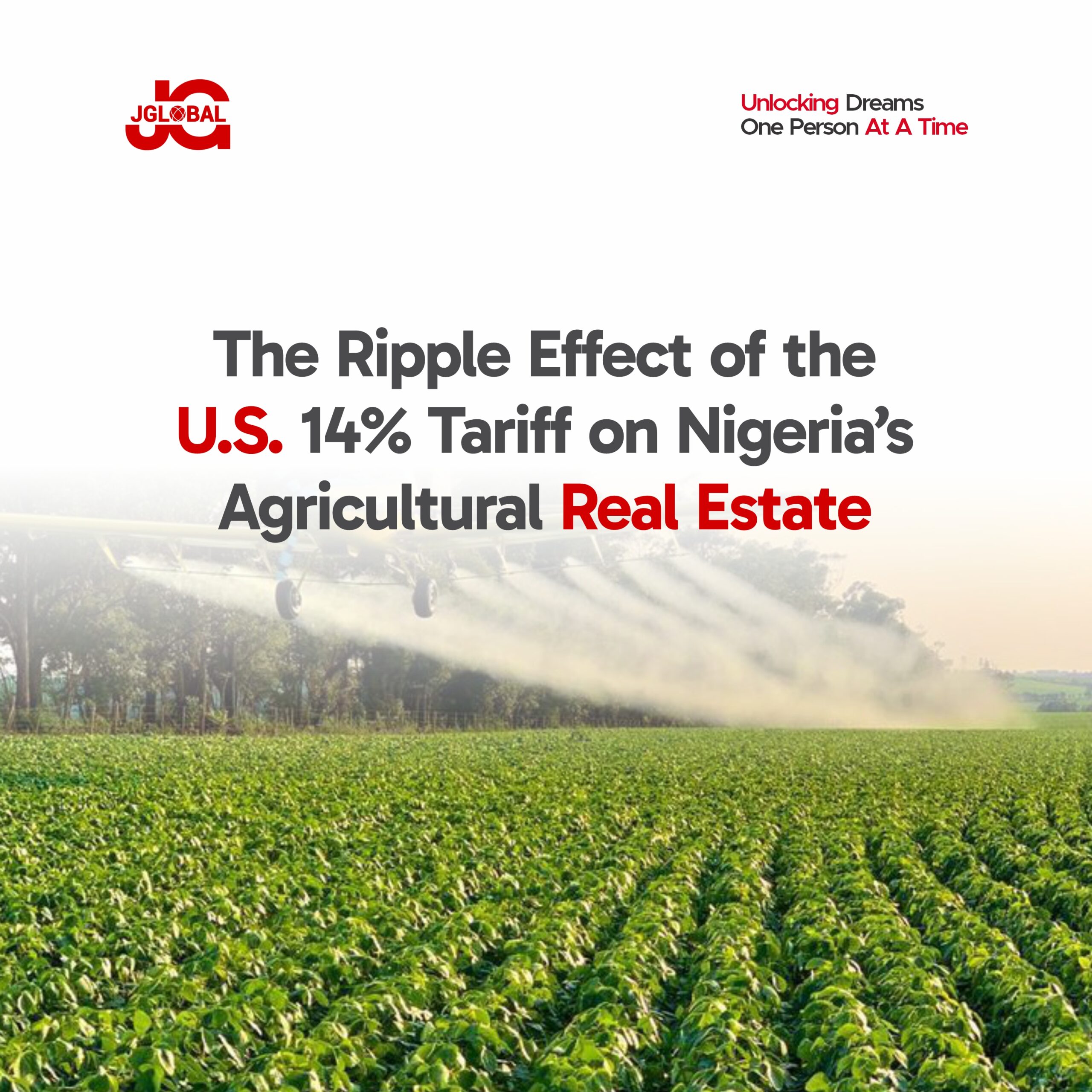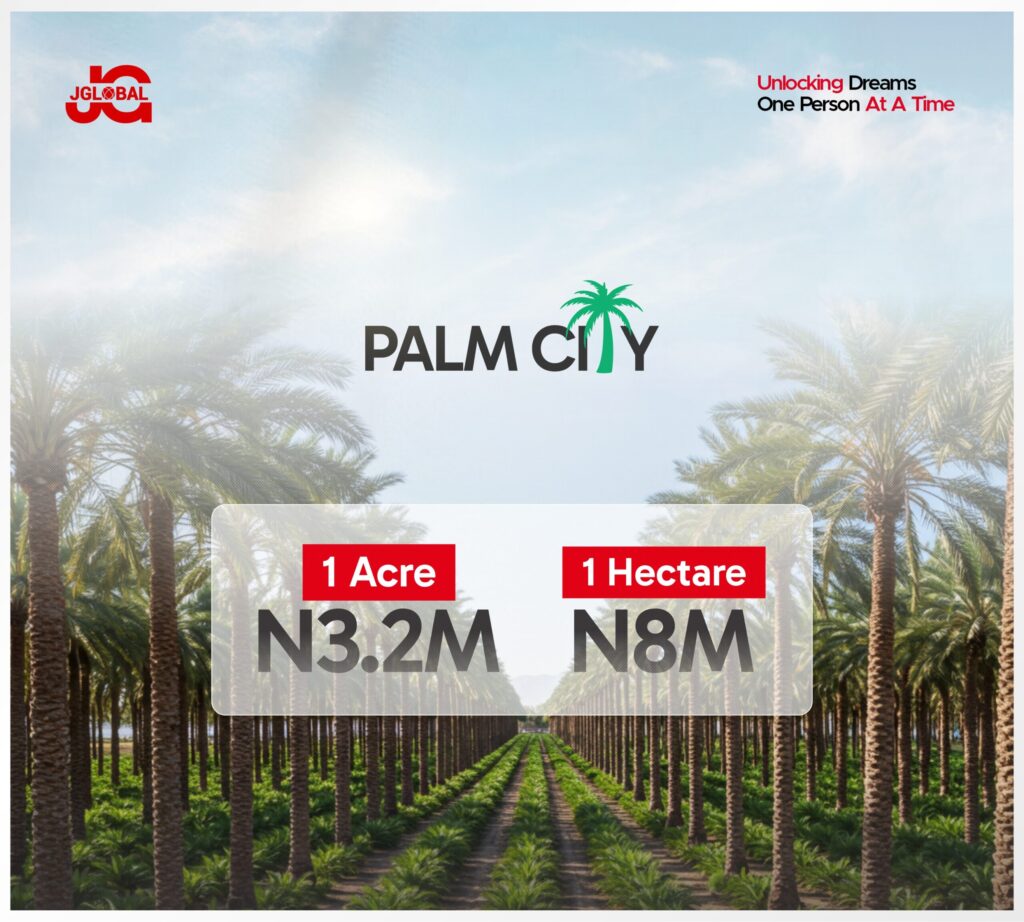The Ripple Effect of the U.S. 14% Tariff on Nigeria’s Agricultural Real Estate

You might have heard by now that the United States has placed a 14% tariff on Nigerian exports. This tariff might be good or bad for Nigeria’s agricultural real estate sector.
Now, if you’re not familiar with the term, a tariff is simply a tax placed on goods that are being imported into another country. In this case, Nigerian products going into the U.S. are being taxed an extra 14%. This makes those goods more expensive for U.S. buyers, which usually leads to lower demand.
At first, this might sound like a distant policy decision. But for anyone involved in Nigeria’s agricultural real estate, it’s already making waves.
What is The Link Between International Tariffs and Nigeria’s Agricultural Real Estate?
You might be wondering: what does a tariff in the U.S. have to do with farmland in Nigeria?
Well, quite a lot.
For years, crops like sesame seeds, cocoa, cashew, and ginger have been major exports from Nigeria to the U.S. Because American buyers kept demanding these products, land in farming zones became highly valuable. Prices went up. Processing factories opened. Agribusiness was booming.
Farmers, processors, and even people who invested in farmland are already feeling the hit.
In some areas, land prices may drop slightly especially near export-focused zones. That once “hot” farmland near processing hubs, might not hold its high price this year.
So, people are becoming more careful. And honestly, that’s fair. Buying land is no longer enough. What matters now is how you use it.
Still, it’s not all bad news.
There’s a silver lining here, Nigerian agricultural products aren’t only wanted in the U.S. Countries in Africa, the Middle East, and Asia are also interested. Thanks to AfCFTA (the African Continental Free Trade Area), our goods can reach more countries across the continent, faster and cheaper.
This shift means that land near trade routes, transport hubs, and border towns is becoming more important. These areas could be the next big thing for smart investors.
Strategic Moves for Agricultural Real Estate Investors
- Make Your Land Work for You
Buying farmland is only the first step. You need to find ways to make it productive beyond just planting crops. Think about adding value like setting up mini-processing units, packaging centers, or storage areas.
You can also lease part of your land to local businesses or startups in the food space. That way, you’re not just waiting for land value to rise you’re earning from it consistently.
- Go Beyond the Surface
Land that supports more than just farming is where long-term value lives. If your property can host activities like drying, cleaning, or storing produce, it becomes more attractive to different players in the agri chain. Instead of focusing only on the farm side, think of how your land fits into the entire production process.
- Focus on Accessibility and Infrastructure
Even with all the changes in the market, one thing stays the same: access is everything. Land that’s easy to reach, close to markets, with basic amenities like roads, water, and electricity will always attract demand. It’s the difference between a land that sits idle and one that fuels a growing business.
- Get Guidance from the Right People
This is not the time to move blindly. Work with people who understand Nigeria’sagricultural real estate, professionals who know the regions to watch, policies that could impact pricing, and where development is quietly happening. Their insights can help you avoid costly mistakes and make smarter, future-focused decisions.
Why You Must Talk About Your Investment Plans Especially Now
With the U.S. placing a 14% tariff on Nigerian exports, the stakes are even higher.
This isn’t the time to keep quiet when it comes to investment in real estate.
That tariff is already changing the game for agricultural exports and by extension, the value of farmland tied to those exports. If you’re not having real conversations about your goals, your options, and your next move, you’re setting yourself up for trouble.
Tariffs affect demand. Demand affects land value. If you don’t understand how all these pieces connect, you might buy into hype or sell out of panic.
This is why sharing your plans, asking questions, and involving experts matters more than ever. Nigeria’s Agricultural real estate isn’t just about owning land anymore. It’s about positioning, timing, and strategy.
Your best asset isn’t just the land it’s the insight that helps you use it wisely.
Conclusion
This tariff might slow things down in the short term, but it also creates room to rethink your strategy. Nigeria’s agricultural real estate is still a smart play if you know how to read the signs and move wisely.




